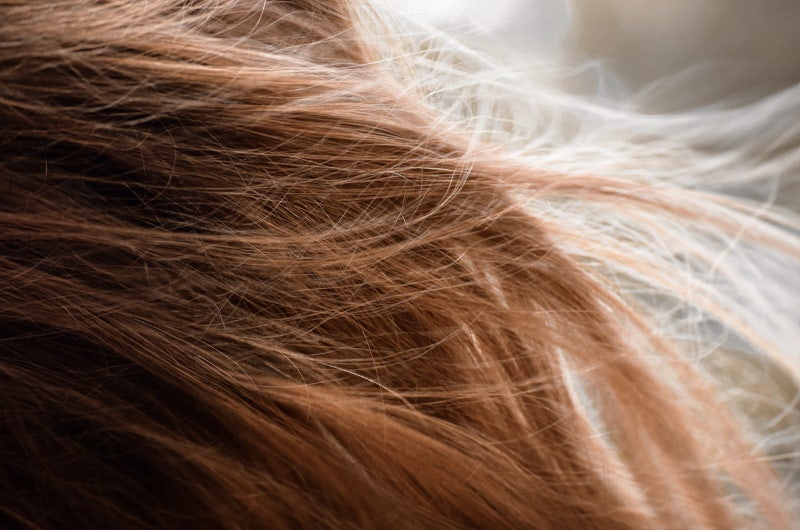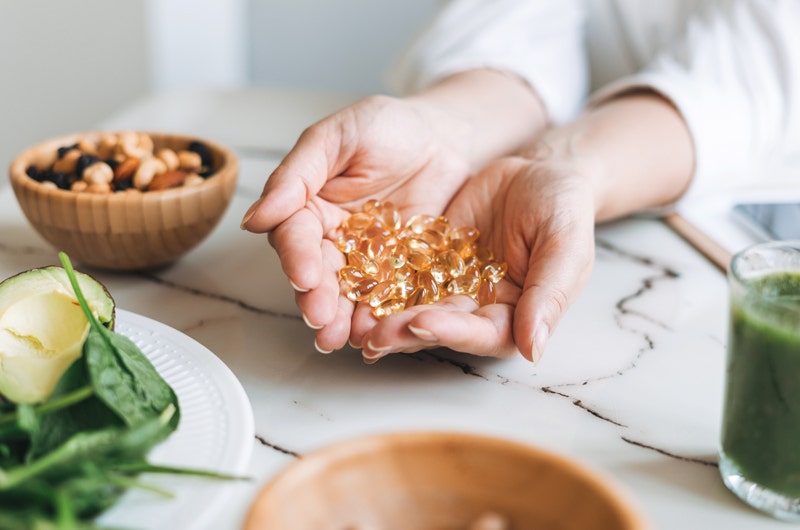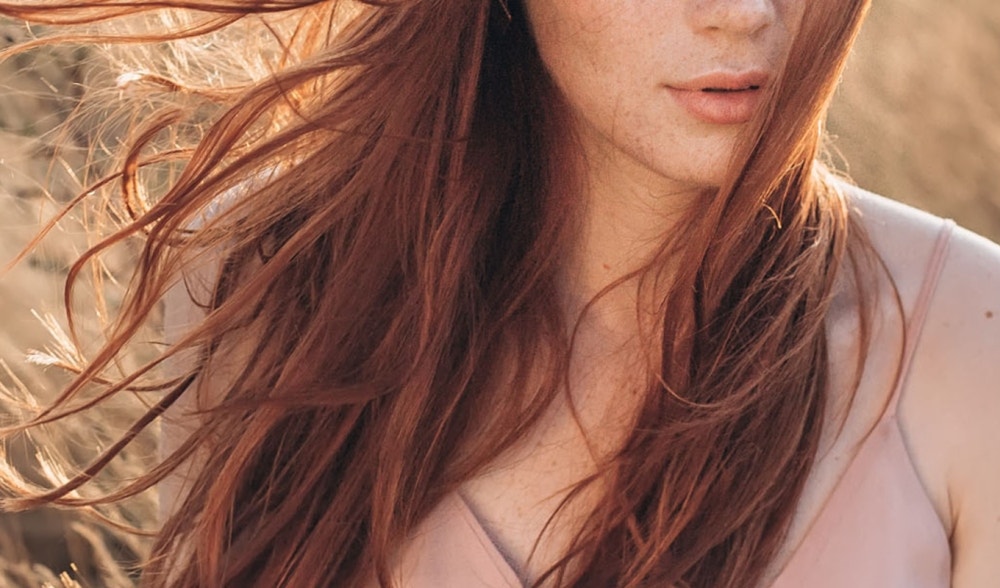Having healthy looking hair is an unmistakable sign of good health. Hair is essential for expressing your personality, getting noticed and feeling good about yourself.
To show off strong and healthy hair, unfortunately, it is not enough to buy the latest formulated shampoo or trendy mask: hair care also starts from our tables. In addition to the choice of non-invasive, quality products and healthy habits in hair-care, a key role is played by the choice of nutrients.
Innovative products to strengthen the hair are in fact put on the cosmetics market all the time, but how can we take care of our precious hair also through nutrition and natural supplements? Get ready to take note, because we are ready to reveal all the tricks to deeply nourish your hair starting with food to strengthen it and make it brighter. Let's see them together right away!
The hair seen up close
How is the hair made?

Hair is hair, or keratinized skin appendages, which originate at the horny level of the skin of mammals. In particular, they are defined as "terminal" hairs (large and pigmented) and, when they undergo regression (as in the case of alopecia), they do not disappear or fall out, but gradually become more and more similar to "fleece" hair (very thin and colorless). Each hair originates from a hair bulb, a very active area from the point of view of metabolic activity, and develops in a well-characterized structure, consisting of three superimposed layers:
- marrow,
- bark,
- cuticle.
The medulla is a disordered region in the center, surrounded by the cortex containing most of the fibrous mass (primarily keratin Protein and structural lipids). The cortex is finally surrounded by the cuticle, a layer of overlapping dead cells whose task is to form the actual protective layer.
Hair growth rate
Hair is the tissue with the highest replicative potential in the human body. The hair growth rate is in the range of 0.5cm-2cm per month. Obviously, this speed depends on several factors:
- genetics,
- sex,
- age,
- hormonal picture.
Typically, optimal hair growth occurs from adolescence up to about 30 years, and then decreases around 40-50 years. The life cycle includes 3 phases: growth, maintenance and rest. At the end of this last phase, hair loss occurs, completely physiological and necessary for correct renewal ( turnover ).
Our hair, however, is perpetually exposed to stressors of various kinds, such as hormonal variations, lifestyle, incorrect behavior, environment, and a good negative influence also derives from the psycho-physical state of the subject. The hair can therefore easily get stressed, weaken and therefore undergo an early fall, both of "physiological" origin and of a pathological nature (as in androgenetic alopecia ).
This condition is indirectly influenced by heredity: the factor responsible for " hair loss " is a dysfunction in the metabolism of dehydrotestosterone (DHT), a metabolite of testosterone . It is therefore denied that testosterone is directly responsible for baldness, to become aware that the excess production of DHT and its excessive uptake by the receptors may participate in the degeneration of the scalp. How can we strengthen the hair?
In addition to specific lifestyle precautions (adequate sleep, stress limitation, no alcohol and no smoking) and, in the most serious cases, pharmacological treatment, it is also very important to adopt a balanced diet, since nutrients are essential to guarantee the correct physiological cycle of all tissues (and especially if with high proliferation as happens for the hair bulb). From the blood must therefore be guaranteed a constant supply of these nutrients, because, unlike what is believed, the nourishment of the hair must start from the inside. Let's see together what are the substances that help strengthen hair, what role they play and where we can find them in foods and supplements.
Foods that are good for your hair
Protein
Our attention must initially be directed towards the quantity and quality of Protein and amino acids in our diet, since keratin (the main constituent of our hair) is just a protein, and has a structural function. Low-protein diets are associated with a greater fragility and risk of hair loss, because the building blocks necessary for their formation (which are precisely Protein and amino acids) are lacking. Wanting to be technical, some amino acids in particular, such as cysteine and methionine, which are called sulfur amino acids, are particularly important because they are present in higher percentages in the amino acid sequence of keratin. In fact, without these molecules anabolism does not occur and new hair cannot grow. Here then is that a consumption of high biological value protein sources, such as fish, eggs and white and red meat in the right quantities, is indicated and essential to ensure beauty and strength to our hair.
Fatty acids

Cell membranes, including those of the scalp, are composed of lipids; it is therefore important to consume the right amounts of fat. In particular, omega 6 (in the right levels) and omega 3 fatty acids are recommended, found mainly in oily fish, dried fruit or vegetable oils (EVO oil in primis).
Vitamins
Vitamins are involved in almost all cellular processes and therefore also participate in the life cycle of the hair. Among those that are especially important for hair health are the following:
- Vitamin C and Vitamin E. Extraordinary antioxidants able to counteract excess free radicals that could damage the scalp and the hair bulb, preventing proper growth. Furthermore, vitamin C favors the assimilation of iron, a mineral essential for cellular supply and is involved in the "resistance" of all skin appendages, including hair.
- Vitamin D. Deficiencies in this vitamin are associated with abnormal hair loss, especially in susceptible individuals. Furthermore, it seems to carry out an action that favors the birth of new hair bulbs, thus contributing to the thickening of the crown.
- Vitamin A. Involved in the protection from external agents and in the synthesis of keratins. Deficiencies in this vitamin lead to brittleness and opacity of the hair, as well as dryness of the scalp.
- Vitamins of group B. B1, B2, B3 and B5 favor the nourishment of follicular cells: vitamin B5 is even called the "anti-hair loss vitamin" thanks to its protective effect on the scalp. B6, on the other hand, helps to limit the formation of dandruff and to counteract the action of androgenic alopecia by acting on the levels of DHT. B9 is related to the rate of cell proliferation. B12 prevents hair loss and B7 ( biotin), finally, is considered the most important element for the hair as it is involved in numerous metabolic reactions. Biotin is used extensively in the treatment of hair disorders, with a rich scientific literature to support it. It contributes to the metabolism of fats and Protein and participates in maintaining the skin integrity of the growing tissue.
Mineral salts
Mineral salts are also very important for a thick and healthy mane and their deficiency can be the basis of weak, brittle hair and a high risk of early fall. Among these should be mentioned:
- Iron. It is involved in cellular oxygenation processes and its deficiency is responsible for undernourishment at the level of the hair bulb.
- Selenium. Strong antioxidant of considerable support in cell growth.
- Zinc. A constituent of the hair structure.
- Sulfur. Important to give tone and strength to the hair.
- Copper. Involved in processes related to pigmentation.
These microelements can be taken naturally through food, consuming a varied diet every day rich in plant sources such as fruit, vegetables and whole grains, or through supplementation (sometimes they are not introduced in sufficient quantities with the diet).
Waterfall
There is little to say about water: the correct water balance is also essential for maintaining an optimal tone of our hair. It is therefore recommended to stay hydrated during the day by drinking plenty of water (about 2lt).
Natural supplements for hair
As for natural hair supplements , these can be very useful in case you don't get enough nutrients from the diet alone. To the classic formulations with proven efficacy ( multivitamins, multiminerals, Protein and amino acids), there are added some natural extracts with a promising nutraceutical effect.

Being a relatively new area, the data we have, although encouraging, must nevertheless be interpreted with scientific rigor. The plants from which these supplements are obtained, which have high contents of polyphenols and useful antioxidant substances, are the following:
- Panax ginseng
- Malus pumila
- Moringa Oleifera
- Allium sativum
- Camelia sinensis
- Rosmarinum officinalis
Conclusions
As we have seen, an apparently banal element such as hair contains an enormous complexity. Understanding all the mechanisms underlying its physiology in order to be able to adopt and develop all the strategies necessary to preserve its state of health is very important. Caring for our hair also means caring for ourselves: as always, maintaining a balanced lifestyle can really make a difference.
Have you ever tried taking a hair supplement? Have you noticed the difference? Tell us in the comments!
Bibliography
[1] B. Buffoli et al., "The human hair: From anatomy to physiology," Int. J. Dermatol., vol. 53, no. 3, pp. 331-341, Mar. 2014, doi: 10.1111/ijd.12362.
[2] R. D. Sinclair, "Healthy hair: What is it?," in Journal of Investigative Dermatology Symposium Proceedings, 2007, vol. 12, no. 2, pp. 2-5, doi: 10.1038/sj.jidsymp.5650046.
[3] L. J. Goldberg and Y. Lenzy, "Nutrition and hair," Clin. Dermatol., vol. 28, no. 4, pp. 412-419, 2010, doi: 10.1016/j.clindermatol.2010.03.038.
[4] "Nutrition and hair health | The Trichological Society." https://www.hairscientists.org/hair-and-scalp-conditions/nutrition-and-hair-health (accessed Jul. 02, 2020).
[5] A. M. Finner, "Nutrition and Hair. Deficiencies and Supplements," Dermatologic Clinics, vol. 31, no. 1. Dermatol Clin, pp. 167-172, Jan. 2013, doi: 10.1016/j.det.2012.08.015.
[6] H. M. Almohanna, A. A. Ahmed, J. P. Tsatalis, and A. Tosti, "The Role of Vitamins and Minerals in Hair Loss: A Review," Dermatology and Therapy, vol. 9, no. 1. Springer Healthcare, pp. 51-70, Mar. 01, 2019, doi: 10.1007/s13555-018-0278-6.
[7] D. P. Patel, S. M. Swink, and L. Castelo-Soccio, "A Review of the Use of Biotin for Hair Loss," Skin Appendage Disorders, vol. 3, no. 3. S. Karger AG, pp. 166-169, Aug. 01, 2017, doi: 10.1159/000462981.
[8] E. Bassino, F. Gasparri, and L. Munaron, "Protective role of nutritional plants containing flavonoids in hair follicle disruption: A review," International Journal of Molecular Sciences, vol. 21, no. 2. MDPI AG, Jan. 02, 2020, doi: 10.3390/ijms21020523.


Comments
Write a comment about the article